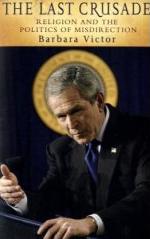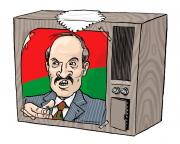
Barbara Victor
The Last Crusade: Religion and the Politics of Misdirection
London: Constable, 2005
This review refers to the UK paperback edition.
An evangelical advisor to George W Bush who believes that to kill by dying has been “programmed into the DNA of all Arab people since the beginning of time” (242). An ex-associate of the Promise Keepers who claims he saw “homosexual advances” by other members (177). A well-known Charismatic Christian leader who urges adult men to get circumcised because “God wants to touch man’s creative parts” (178). Just three of the more remarkable anecdotes that appear in Barbara Victor‘s The Last Crusade: Religion and the Politics of Misdirection. Victor, a CBS journalist, overviews the political significance of the US Christian right, concentrating on the current administration and on Christian Zionist organisations. Much of the ground is familiar, and there are some unfortunate errors in places, but the book contains important interview material and draws attention to some significant players.
The book is divided into three sections: a historical discussion of “The Birth of Evangelical Christianity”; “The Evangelicals and Israel”; and a short round-up of assorted material entitled “The Jesus Factor”. Poor structure means that at least one chapter in the first part (“To Walk Where Jesus Walked”) would have been better placed in the second.
This second section, which is the most substantial, introduces a number Christian Zionist strategists and lobbyists, such as Annette Lantos, husband of Tom Lantos (and, incidentally, cousin of Zsa Zsa Gabor). Annette is a Jewish convert to Christianity who believes God has spoken to her directly, while Tom is an atheist, but the two of them work closely with CIPAC, the Christians’ Israel Public Action Campaign. Annette believes that God has made Palestinians into terrorists so that the “Road Map” will not work (228).
Victor also meets Esther Levens, who heads the National Unity Coalition for Israel. The NUC is apparently financed by Bridges for Peace and the International Christian Embassy in Jerusalem (ICEJ), and Victor goes along to one meeting where Sam Brownback is the guest speaker. Among those in attendance, Victor notes (206) retired Brigadier General James M Hutchens, who is a former US army chaplain and president of Christians for Israel, and the ubiquitous Frank Gaffney. Gaffney tells Victor that
Those who are fervent in their support of Israel are now welcome in the Bush White House…What you’re seeing today is that the policy of the United States government is being influenced by a group of people on the outside who are influencing those on the inside, when it comes to the American position on the Israeli-Palestinian conflict. (206-7)
On another occasion, Levens tells Victor that she supports “transfer” – the expulsion of Palestinians from the West Bank (or rather, from “Judea and Samaria”) – but she acknowledges that “We have to put it in such a way that it doesn’t offend people” (230). Gary Bauer agrees with her that “we have to present it in a way that is not incendiary”. Richard Hellman, who heads CIPAC, explains that transfer could be organised over several years, and that
Senator Inhoff, Brownback, [Mark] Pence, Todd Tiart, and also Tom Lantos are in our corner, as are Tom DeLay and Dick Armey when he was in Congress, as well as the famous runner Jim Ryan… (212)
There is also an encounter with George and Cheryl Morrison, who run the Faith Bible Church of Denver. This church has a particular link with the Israeli settlement of Ariel, and church members go on tour there – for which purpose they don Israeli army uniforms. The Morrisons claim that a famous Evangelical singer is a member of their congregation, and that this person is close to Bush and has warned him not to push the Road Map or to criticise the Separation Wall (219-222).
Christian Zionism is also evident at Clear Channel; Herb Zweibon of Americans for a Safe Israel boasts that a Christian minister who sits on the board of the company gave him a special deal for billboard advertising in order to oppose concessions to the Palestinians (225). According to Bush aide Doug Wead:
Ninety per cent, in fact, of all Americans believe in a personal God, and that’s a very high number. So I wouldn’t put any bets on any Middle East peace accord just now. (260)
However, while these quotes are undoubtedly very valuable, Victor’s conclusions are not always clear-cut. For example, she claims that Bush’s infamous use of the word “crusade” was inspired by Ed McAteer’s description of Muhammad as a “terrorist”; but she doesn’t satisfactorily show how the two speeches were connected (38); it’s troubling to see the author go so blithely beyond the evidence.
A number of factual errors in the book also seriously undermine its value. Perhaps the most egregious appears on page 62, where Victor gives a historical overview of Abraham Vereide’s secretive organisation “The Family” and tells us that John F Kennedy was among those who decided on the course of the organisation following Vereide’s death. Vereide died in 1969. We’re also told (265) that 14 April 1996 was “shortly before” the Rabin-Arafat handshake, when in fact Rabin had been assassinated the previous November (the handshake was actually 13 September 1993). Another howler makes William Jennings Bryan a Republican, and William McKinley by implication a Democrat (57). Even Bill Clinton’s most famous utterance is unnecessarily and perplexingly botched, becoming “I have never had intercourse with that woman” (139).
Victor is also unsure of her ground when giving us the wider evangelical context, and it is significant that her endnotes contain no references to scholars of American evangelical history such as Randall Balmer, George Marsden, or Mark Noll. She tells us that Mike Evans and Ed McAteer established the National Prayer Breakfast in 1953 (59) – but Evans was born in 1947! She’s confused the famous Eisenhower-era event with Evans’s National Prayer Breakfast in Honor of Israel. She also calls Evans “a leader in the ‘Mission-to-the-Jews’ movement”, without explaining what that means. Mel Gibson is supposedly an adherent of the neo-Pentecostal Vineyard grouping of churches (176), which is particularly weird given that his Catholic traditionalism is common knowledge. The Southern Baptist Convention is described as “the largest group of Charismatic Christians in America” (237), when Charismatic Southern Baptists are in fact somewhat marginal.
The book is also only a partial account. Christian Zionism is an important factor in Evangelical foreign policy concerns, but it is not the whole story. To their credit, Evangelicals have also taken on internationalist concerns such as human trafficking, Darfur, and (more controversially within the movement) the environment. Allen Hertzke’s 2004 Freeing God’s Children: The Unlikely Alliance for Global Human Rights comes to mind as a corrective (as well as being by far a more substantial work).
There are also a few places where a stronger editorial hand might have avoided some literary embarrassments. Victor visited a Baptist congregation which “literally glowed” (9), and when the USS St Louis sank during World War II, Ed McAteer was “one of the sole survivors” (31).
The Last Crusade gives the distinct impression of being a journalistic potboiler knocked off in a hurry, which is a great shame, as it could have been a significant contribution. I found it contained a lot of useful information, but I kept wondering about the accuracy of the material I was reading.
(Cross-posted to Talk to Action)
Filed under: Uncategorized | 2 Comments »





